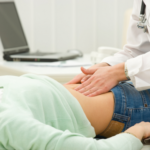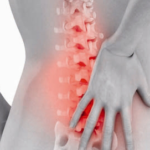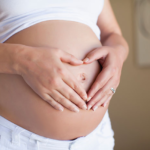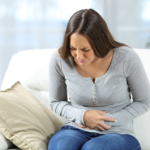Management of a pregnant woman with a hernia in the lumbar spine
Various pathologies of the spine today are found not only among the elderly, but also among young people. Girls, alas, are also prone to degenerative diseases of the musculoskeletal system. Many of them are wondering if it is possible to give birth if there is a hernia in the lumbar spine?
The compatibility of a hernia of the lumbar spine and pregnancy for many remains in question. Is it possible to plan a child without getting rid of the pathology? What is the compatibility of a lumbar hernia and pregnancy? What to do to make it easier for yourself the process of bearing a child?
Features of different periods
Lumbar hernia is a pathology that develops for many reasons. First of all, today doctors distinguish hypodynamia. People tend to sit more and move less, which negatively affects the spinal column. Additional risk factors are malnutrition, neglect of sports, and the abuse of various bad habits.
With a hernia of the lumbar spine, a woman may complain of pain, limited mobility in the spinal column, numbness of the limbs and other unpleasant symptoms. As the protrusion progresses, the symptoms will only intensify.
Intervertebral hernia and pregnancy - a combination, contrary to popular belief, is not contraindicated. True, a woman should be prepared for the fact that the combination of pregnancy with a hernia of the lumbar spine will lead to additional complications that will have to be eliminated.
It is possible to give birth with an intervertebral hernia, but before that, a woman should be familiar with all the possible consequences. The consequences at different stages of pregnancy can be very diverse. In some cases, a strong development of protrusion can lead to the fact that after childbirth a woman will become disabled.
Conception
Since each period of pregnancy with a vertebral hernia is accompanied by a set of its own problems, a woman suffering from pathology should be familiar with all the problems that may arise at different stages.
The first stage in the birth of a child is conception. Protrusion, regardless of stage, does not have any effect on the process of conception. That is, a couple can conceive a child without problems, even if they have a very pronounced disease.
True, during conception, unpleasant problems may arise, such as:
- severe pain in the lumbar region;
- inability to move freely, bending, unbending, taking a flat position;
- problems even with normal walking, such as lameness from a pinched spinal nerve;
- a strong decrease in sensitivity in the lower extremities or, on the contrary, its excessive increase;
- complaints of unpleasant, unusual sensations, such as tingling, numbness, etc.
If these symptoms are severe, the woman's doctor recommends taking painkillers. Many of them do not contribute to conception, and in some cases they not only do not contribute to conception, but also negatively affect the fetus.
If a strongly pronounced hernia is located in the lower back, a violation of the functioning of the pelvic organs is possible. The female reproductive system also suffers. If the activity of the reproductive system is disturbed for a long time, and this is not corrected in any way, there may be difficulties with the onset of conception.
Pregnancy
The development of a hernia of the lumbar spine during pregnancy does not contribute to the process of bearing a child and can complicate it quite a lot. Moreover, the very process of gestation complicates the course of pathology in the spinal column.
For pregnant women, the presence of a hernia is fraught with the following problems:
- increased load on the spine due to a pronounced shift in the center of gravity;
- pressure of the uterus with the fetus on the spinal column, which does not contribute to reducing the load;
- Decrease in the density of cartilage in the spine and hip joints (necessary to prepare for the birth process) also increases the size of the defect, reducing the stability of the spinal column;
- excess weight, like a woman outside of pregnancy, does not contribute to the disappearance of the defect.
Of course, many believe that pregnancy is a physiological process that no disease can complicate. But this, alas, is not so. A hernia of the spinal column during pregnancy not only worsens, but can also lead to unforeseen consequences.
Interestingly, the first trimester of pregnancy can be uneventful for a woman. The first symptoms of exacerbation will appear only when the fetus begins to actively grow and gain weight.
The most difficult period of pregnancy is prenatal. At this time, the fair sex develops the maximum load on the musculoskeletal system.
The process of childbirth
Giving birth with a hernia is another difficult test for the fair sex. The fact is that childbirth is a process that requires enormous physical exertion. And with hernial defects, any tension on the spinal column is categorically contraindicated.
During the period of attempts with an intervertebral hernia, the risk of developing an infringement increases significantly. Infringement is a dangerous complication, which is accompanied by a very acute, sometimes unbearable pain syndrome.
In addition to the pain syndrome, symptoms from the nervous system will also be pronounced.
It includes:
- feeling of numbness in the legs;
- feeling as if goosebumps were crawling up the lower limbs;
- various problems with the work of the pelvic organs;
- lameness.
Many women believe that with a combination of vertebral hernia and pregnancy, it is better to choose a caesarean section, but this is not always an acceptable option. However, with a hernia of the spine, a caesarean section is still performed according to indications.
These include:
- the presence of a large defect;
- an excessively low protrusion is also an indication;
- high risk of infringement or the presence of neurological symptoms;
- the woman has any other problems that can aggravate the situation.
A caesarean section is an operation that is ideally best avoided if the woman can give birth herself with minimal problems.
Reduce the risk of exacerbation
For pregnant women in whom a spinal column defect was detected before the conception of a child, there are recommendations that must be taken to avoid various complications.
These include:
- careful choice of nutrition during the period of gestation (preference is given to the most healthy food);
- physical activity (it is important to remember that pregnancy is not a disease in which you need to lie down all day, the fair sex is recommended regular walks and at least minimal, but still activity);
- sports activities (non-aggressive exercise is recommended, such as yoga, light warm-up, gymnastics, but sports where you need to lift a lot of weight are contraindicated);
- to prevent intervertebral hernias of the back, it is worth avoiding a long stay in a sitting or standing position;
- additionally, a bandage or corset is recommended, which will ease the load on the musculoskeletal system (it can be continued to be worn even after the woman has already given birth).
Permitted treatment
A hernia of the spine and pregnancy is a possible symbiosis, which is treated mainly with the help of sparing techniques. Recommended physical activity, proper nutrition, the rejection of bad habits. With severe symptoms, the selection of medical treatment is necessary.
The following groups of drugs are considered as sparing as possible:
- non-steroidal anti-inflammatory drugs such as Paracetamol, Nurofen, etc.;
- natural sedatives such as valerian tincture, chamomile, motherwort, etc.
Additionally, exercise therapy, corsets, light types of spinal traction (for example, in water), wearing special shoes are used.
It is important to remember that the method of treatment should be chosen only by the attending physician or specialist who manages the pregnancy. If you try to self-prescribe medications for yourself, you can harm not only yourself, but also the unborn baby. Many medicines are strictly prohibited during pregnancy.
So that the process of bearing a child is not complicated by a hernia of the spinal column, women are advised to engage in family planning. Before conceiving a child, you should consult with doctors, find out if there is a tendency to develop a defect and, if so, take measures to reduce the risks.
A deliberate approach to pregnancy and subsequent childbirth can protect a woman from a herniated lumbar spine and other unpleasant complications.










